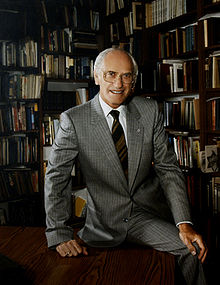- Gunther Plaut
-
Wolf Gunther Plaut, CC, O.Ont (* 1. November 1912 in Münster) ist ein kanadischer Reformrabbiner und Autor. Er war mehrere Jahrzehnte lang Rabbiner des Holy Blossom Temple in Toronto[1].
Inhaltsverzeichnis
Leben
Plaut wurde in Münster als Sohn von Jonas und Selma Plaut (1890-1993) geboren, die von 1922 bis 1938 das Auerbachsche Waisenhaus in Berlin führten. Sein jüngerer Bruder Walter (1919-1963) war ebenfalls Rabbiner in Great Neck, New York. Plaut promovierte im Fach Jura, musste Deutschland aber 1935 verlassen und emigirierte in die USA. 1939 wurde er am Hebrew Union College zum Rabbiner ordiniert und kehrte als Militärrabbiner der US-Streitkräfte nach Deutschland zurück und war an der Befreiung des Konzentrationslagers Mittelbau-Dora beteiligt. Nach dem Krieg war er zunächst Rabbiner in Chicago und St. Paul. 1961 kam er zum Holy Blossom Temple nach Toronto. Neben seiner Tätigkeit als Rabbiner dort, veröffentlichte Plaut eine Reihe von Artikeln und Büchern zum Judentum. 2001 besuchte Gunther Plaut eine Jahrestagung der Union für Progressives Judentum in Halberstadt[2]. Seitdem bei ihm Alzheimer diagnostiziert wurde, trat Gunther Plaut nicht mehr öffentlich auf[3].
Werk
Gunther Plauts Kommentar zur Tora und zur Haftara gehört heute zu den Standardwerken der progressiven Strömungen. Eine deutsche Übersetzung seines Tora-Kommentars erschien in den Jahren 1999 bis 2004 in fünf Bänden.
Auszeichnungen
- 1999: Großes Verdienstkreuz [4]
Werke (Auswahl)
- The Torah: a Modern Commentary, ISBN 0-8074-0055-6
- The Price and Privilege of Growing Old, ISBN 0-88123-081-2
- The Rise of Reform Judaism: A Sourcebook of Its European Origins (1963)
- Asylum: A Moral Dilemma (1995), ISBN 0-275-95196-0
- Unfinished business: an Autobiography (1981), ISBN 0-919630-41-3
- More Unfinished Business (1997), ISBN 0-8020-0888-7
- The letter (1986), ISBN 0-7710-7164-7
- The Man in the Blue Vest and Other Stories (1978), ISBN 0-8008-5093-9
- Hanging Threads: Stories Real and Surreal (1978), 0919630995
- The Man Who Would Be Messiah: A Biographical Novel (1990), ISBN 0-88962-400-3
- The Jews in Minnesota; the first seventy-five years (1959)
- Your neighbour is a Jew (1968)
- The Sabbath as Protest: Thoughts on Work and Leisure in the Automated Society (1970)
- The Torah: A Modern Commentary, Revised Edition, ISBN 0-8074-0883-2
Literatur
- Gisela Möllenhoff ; Rita Schlautmann-Overmeyer : Jüdische Familien in Münster 1918 bis 1945. Biographisches Lexikon Münster : Westfäl. Dampfboot, 1995 ISBN 3-929586-48-7 , S. 161
Weblinks
- Literatur von und über Gunther Plaut im Katalog der Deutschen Nationalbibliothek
Einzelnachweise
Wikimedia Foundation.

